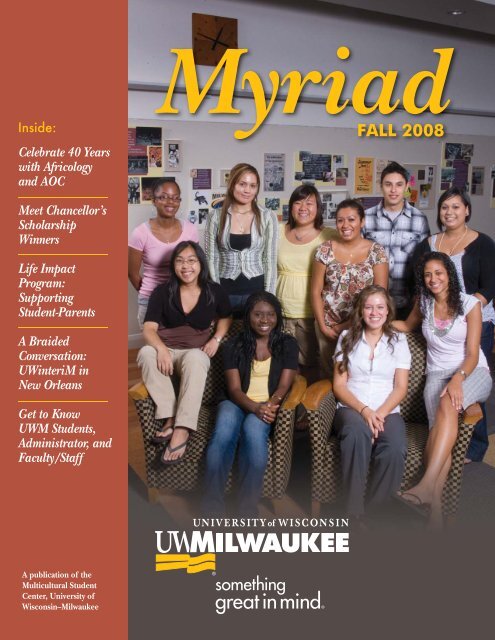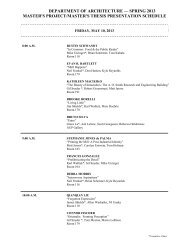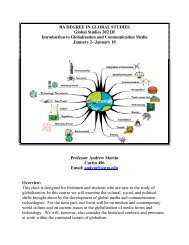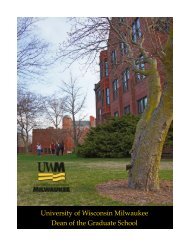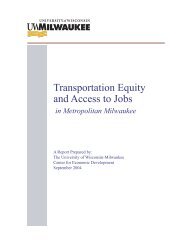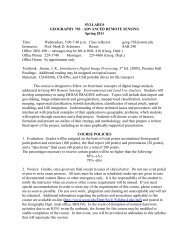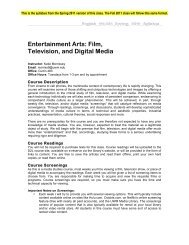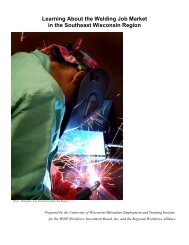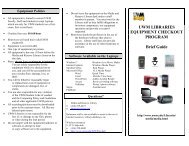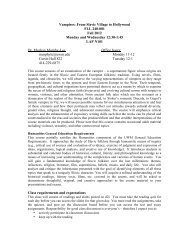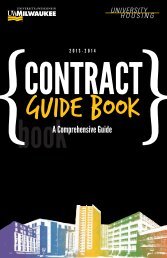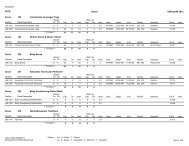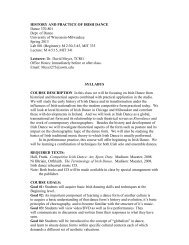FALL 2008 - UW-Milwaukee
FALL 2008 - UW-Milwaukee
FALL 2008 - UW-Milwaukee
You also want an ePaper? Increase the reach of your titles
YUMPU automatically turns print PDFs into web optimized ePapers that Google loves.
MyriadInside:Celebrate 40 Yearswith Africologyand AOC<strong>FALL</strong> <strong>2008</strong>Meet Chancellor’sScholarshipWinnersLife ImpactProgram:SupportingStudent-ParentsA BraidedConversation:<strong>UW</strong>interiM inNew OrleansGet to Know<strong>UW</strong>M Students,Administrator, andFaculty/StaffA publication of theMulticultural StudentCenter, University ofWisconsin–<strong>Milwaukee</strong>
MESSAGE FROM CHANCELLOR CARLOS E. SANTIAGOThrough New Africology PhD Program,We Expand Our HorizonsThe University of Wisconsin–<strong>Milwaukee</strong>in June <strong>2008</strong> took another significantstep toward providing academic andresearch depth and breadth when it receivedapproval from the <strong>UW</strong> System Board ofRegents to offer a doctoral degree inAfricology. It was a success 10 years in themaking and, like other recent progress madeat <strong>UW</strong>M, was the result of a perseverancethat I have very much come to appreciateamong my colleagues.When I arrived on campus four years ago,I indicated that we had too few doctoraldegrees programs. I offered as perspectivethe campus that I came from, which had athird fewer faculty than <strong>UW</strong>M and yet twicethe number of doctoral programs.I subsequently learned that there was ahistory of difficulties in gaining approval fordoctoral degrees at <strong>UW</strong>–<strong>Milwaukee</strong>, includinga 15-year period from the late 1980s throughthe early part of this century when no newdoctoral degrees were approved for thisuniversity — despite several being discussedand some being formally proposed.It was the doctoral degree in history,approved in 2002 after being initially proposedin 1992, that finally got the processmoving again. Since my arrival, I am pleasedto say that faculty and staff have pushedforward to add doctoral programs in medicalinformatics, physical therapy, informationstudies, social work, communication,educational psychology, and now programNo. 26, Africology.To be competitive, I believe we need tohave between 32 and 35 doctoral programs.<strong>UW</strong>-Madison, it should be noted, has 114doctoral programs. We certainly do not intendto develop that many.Doctoral programs are hugely importantto universities because they attract the verybest faculty. These academicians want to beinvolved in creating the latest knowledge atthe forefront of their respective fields. This isdone through their own work and the newideas that often emerge through interactionwith excellent students attracted to auniversity that will allow them to earn thehighest of all degrees.I am very proud of many people formaking our latest doctoral degree possible.Support came from across campus, but it allstarted with the faculty and staff in theDepart ment of Africology working for adecade to get this program approved. Everypossible objection raised was ably addressedthrough their patience and professionalism. Icommend them all for their commitment.The importance of their work is clear andvery much reminds me of a segment from abook for which I was a co-author, Adiós,Borinquen querida: The Puerto Rican Diaspora,Its History, and Contributions:“The United States, more than ever,needs to develop a global perspective in theface of the increasing transnationalism andrelations of interdependence. Moreimportantly, it has to deal with the diversitywithin its own borders….In order toaccomplish these goals, educators will needto employ a culturally responsive pedagogy,a multicultural curriculum, and continue tochallenge the social structures whichgenerate inequality in the United States.”One more way <strong>UW</strong>–<strong>Milwaukee</strong> willaccomplish this is through expanding oureducational horizons, and that is being donethrough our doctoral degree in Africology.I again congratulate all involved in itssuccessfully creation. I believe it will be asuperb program.— Carlos E. SantiagoChancellor
CONTENTS2 Celebrating 40 years of programs and services:Department of AfricologyAcademic Opportunity Center5 Full-Ride Scholarships Available for Incoming First-Year Students5 Winners of Chancellorʼs Scholarship for Diversity and Leadership8 Life Impact Program Provides Support for Student-Parents10 A Braided Conversation:<strong>UW</strong>interiM Courses in New Orleans After the Hurricanes12 Multicultural Scholarships AwardedStudent Profiles:13 Catherine VanLeer14 Edgard Rincon15 Anna Connors16 Long Chang17 Erica PeaceAdministrator Profile:18 Patricia ArredondoFaculty/Staff Profiles:19 Swarnjit Arora20 Cynthia Barnes21 Michael Bonds22 Michelle Lopez-Rios23 Linda Walker24 Congratulations, Graduates!Myriad<strong>FALL</strong> <strong>2008</strong>EDITORLINDA HUANGASSISTANT EDITORMARLA HYDERCOORDINATORVICTORIA PRYORAUTHORSLEE ABBOTTANNA CONNERSMATTHEW JAMES GUTIERREZALICIA HAYWOODMARLA HYDERBETH STAFFORDDESIGN/LAYOUTSUSAN McKAY<strong>UW</strong>M VISUAL DESIGN SERVICESPHOTOGRAPHS<strong>UW</strong>M PHOTO SERVICES<strong>UW</strong>M MULTICULTURAL STUDENT CENTERMyriad is produced by theMulticultural Student Center.Its purpose is to highlight<strong>UW</strong>M programs, faculty,staff, and students.ON THE COVER:Chancellor’s Scholarship Winners –Back row (left to right): Megan Glass,Phylicia Rios Rivera, Kimberly Mua,Estee Guzman, Diego Hernandez,Cache Owens. Front row (left to right):Amy Xiong, Olusola Thompson, AlyssaGalaviz, Mary Ghaly. Not pictured:Alex Girgis.Photo by Alan Magayne-Roshak,<strong>UW</strong>M Photo ServicesFall <strong>2008</strong>/Myriad 1
Celebrating 40 yearsDepartment of AfricologyBy Alicia HaywoodSince itsinception in1968, the<strong>UW</strong>MDepartmentof Africologyhas taughtmore than60,000students.The year was 1968. Boomers were in anuproar as they pushed to move thenation towards love, peace, understanding,and equality of gender and race.It was in response to these tumultuous timesthat <strong>UW</strong>M’s Faculty Senate made way for thecreation of a Center for Afro-AmericanCulture, positioning <strong>UW</strong>M as the firstfour-year university in the United States tooffer a program in African-American Studies.Under the direction of Daniel Burrell,the Center transitioned to full Departmentstatus within the College of Letters & Scienceby the 1971-72 academic year and becameknown as the Department of Afro-AmericanStudies. Courses offered through out theDepartment’s first decade were primarily atthe freshman and sophomore levels, andoften in conjunc tion with other areas of studythat highlighted pertinent issues for theAfrican American community, such aseconomics and politics. It wasn’t until 1980that <strong>UW</strong>M began to offer the Bachelor of Artsin Afro-American Studies.In 1994, <strong>UW</strong>M’s Department of Afro-American Studies was renamed theDepartment of Africology, solidifying theprogram’s commitment to a universalcurriculum and distinguishing it from thosethat may have exclusively covered eitherAfrican American or African Studies. Elevenfaculty members in <strong>UW</strong>M’s Department ofAfricology teach and conduct research on awide variety of topics pertaining to politicaleconomy and public policy, as well as thecultures and societies of Africa and the AfricanDiaspora. They focus on countries such as theUnited States, Canada, Haiti, Cuba, Ghana,Ethiopia, Malawi, and South Africa.continued on page 4Department of Africology faulty –Back row (left to right): Winston Van Horne, Abera Gelan, Osei-Mensah Aborampah, Anika Wilson, Patrick Bellegarde-Smith.Front row (left to right): Doreatha D. Mbalia, Erin N.Winkler, Joyce Kirk, Sandra E. Jones, Ahmed Mbalia.2 Fall <strong>2008</strong>/Myriad
of programs and servicesAcademic Opportunity CenterBy Alicia HaywoodIn the midst of frequent references towhat’s gone wrong with education, locallyand nationally, <strong>UW</strong>M’s AcademicOpportunity Center (AOC) may just turnout to be a shining example of what’s goingright. AOC is driven by an extraordinaryteam of diverse academic advisors who areinvested in the mission of transformingunderachieving students into successfulcollege graduates. AOC is designed toconnect these students with the resourcesthey need to confidently navigate the universityexperience. Supporting an average of1,250 students a year, AOC’s 40th anniversarywas ushered in by a banner year with 614 newfreshmen enrolling in the program last fall.For Senior Advisors Jimmy Johnstoneand Kathy Barnes who have been with theprogram since 1970 and 1978 respectively,it’s simply about valuing the students aspeople, believing in them, and acting as theiradvocates. Johnstone explains, “The kids areour greatest resource and when they don’thave the opportunities, you’re just settingthem up for continual exploitation anddomination.” Staying aware of what’s goingon with their advisees goes well beyond thestandard workday. Evenings and weekends— even Super Bowl Sunday — are all fairgame. Barnes says that it’s a matter ofadhering to an early warning system, andmaintaining frequent contact with studentsand their professors. “We’re not spying onthem, we just want to make sure thateverything is going smoothly,” she says.According to April Holland, AOC’s interimassistant director for instruction, “It’s theconcept of community…a family within afamily.”There’s no denying that certain aspectsof the program have evolved over the years.The late Ernest Spaights created it as theExperimental Program in Higher Educationto “attract, admit, and retain minority anddisadvantaged students.” At the time, it was ahopeful antidote to economic conditionsrendering college inaccessible for manyAfrican Americans. Through incarnations asLeft to right: April Holland, interim assistant director for instruction; KathyBarnes, senior advisor; and Ruth Russell, program director.the Department of Educational Opportunityand then Department of Learning Skills andEducational Opportunity, AOC has emergedas a special support program for far fewerstudents of color than in the past.Program Director Ruth Russell cites manyreasons for the demographic shift in thestudent population served by AOC. Highschool graduation requirements have becomemisaligned with those for college admission.That fact combined with pervasive economicstrains breeds situations that leave studentsacross the board ill-equipped to handleuniversity-level demands. “We, as a country,are not as competitive as we used to be andno one individual or institution can beblamed; it’s a societal problem,” says Russell.“We have a larger group of students in oururban setting who are underprepared forcollege and for life,” she adds.continued on next pageIt’s the conceptof community…a family withina family.– April HollandFall <strong>2008</strong>/Myriad 3
Department of Africologycontinued from page 2Celebrating 40 yearsProfessor Patrick Bellegarde-Smith atthe Department of Africology’s 40thAnniversary Celebration.Today, in yet another historic yearfor the nation, <strong>UW</strong>M’s Department ofAfricology marks its 40th anniversarywith the creation of a PhD program.This expansion places <strong>UW</strong>M among anelite group of only eight institutions,including Temple, the University ofCalifornia at Berkeley, Yale, andHarvard, that offer such a doctoralprogram. Set to begin in the fall of2009, the program is expected to attractapplicants from all over the world andwill involve substantial cross-disciplinarycollaboration. It will be organizedaround three areas of focus:• Political Economy and Public Policy• Culture and Society: Africa and theAfrican Diaspora• A concentration outside the departmentin the student’s area of interestJoyce Kirk, associate professor andchair of the Africology Department,In 2009, <strong>UW</strong>M willbecome one of onlyeight institutionsoffering a doctoralprogram in Africology.notes that the Board of Regents’approval of the doctoral degree “sendsa strong signal to Wisconsin and<strong>Milwaukee</strong> residents that this programis an institutional priority.”Since its inception, theDepartment of Africology has taughtmore than 60,000 students. Itsgraduates have gone on to becomephysicians, teachers, lawyers, businessprofessionals, and elected officials.Academic Opportunity Centercontinued from previous pageOne aspect of the program that’sremained consistent over the years isits method of comprehensive evaluationfor admission, which Russell saysis gaining traction on a system-widelevel. “We have always looked at othercriteria than cognitive, quantitativeinformation,” she explains. Test scores,examples of leadership, communityinvolvement, high school extra curricularactivities, and work experienceare all taken into account whenmeasuring a student’s potential foracademic success. Russell adds thatthe 21st century has delivered a uniqueset of obstacles for the program, “It’s adifferent age. Students are just differentand it’s unfortunate that someonetold them along the way, ‘you’re doingvery well.’ So here they are…in somecases not writing a clear, declarativesentence but can text message out ofthis world. Critical thinking is seriouslylacking,” she says.Looking towards the next 40 years,Russell believes that Spaights’ initialidea of building a community within auniversity remains the core of howstudents become successful. “It wasalmost a one-stop shop,” she claims.“Believe it or not, we’re getting backto that.”Jimmy Johnstone, senior advisor4 Fall <strong>2008</strong>/Myriad
Full-Ride Scholarships Availablefor Incoming First-Year StudentsBy Beth StaffordHigh school seniors can againapply for full-ride scholarshipsto <strong>UW</strong>M through a programlaunched in 2007. The Chancellor’sScholarship for Diversity and Leadershipand the Academic AchievementLeadership Award were created by<strong>UW</strong>M to complement the scholarshipsand student aid assistance alreadyoffered.This fall, the first group of studentsreceiving these awards began theirstudies at <strong>UW</strong>M.“I've met many of the young menand women receiving these scholarships,”says Chancellor Carlos E.Santiago, “and am confident we haveselected individuals who can be bothacademic leaders at <strong>UW</strong>–<strong>Milwaukee</strong>and community leaders in the yearsthat follow.”Students with outstanding academicachievement who are interestedin a broad range of experiences andactivities designed to foster leadershipdevelopment and personal growth areencouraged to apply. The two scholarshipawards are applicable to any areaof study at <strong>UW</strong>M.Chancellor’s Scholarship forDiversity and LeadershipThese renewable scholarships includetuition, residence hall (includingmeals), books and miscellaneousexpenses, estimated at more than$20,000 for the 2009-10 academic year.Additional full- and partial-tuitionscholarships also are available. Thescholarships are available to studentswho are historically under representedin higher education and demonstrateoutstanding academic achievementand leadership.continued on page 12Winners of Chancellor’s Scholarshipfor Diversity and LeadershipBy Beth StaffordFollowing is a brief profile on each of the Chancellor’s Scholarship winners. Congratulations tothese outstanding students who are currently enrolled as new freshmen at <strong>UW</strong>M!Alyssa Galaviz (WAUKESHA, WI)WAUKESHA WEST HIGH SCHOOLCURRENT PLAN: UNDECIDEDBesides her leadership roles in theclassroom and in community serviceorganizations, Alyssa was also thecaptain of her track and field team.“As a captain, my determination andmy own desire to become the bestguided me to push others on myteam to reach one common goal.”She agrees with Tolstoy that “the only certain happiness inlife is to live for others,” and she hopes to “improve as manypeople’s lives as I can.”Alyssa’s mother, father, and brother all graduated from<strong>UW</strong>M. “I knew that by choosing <strong>UW</strong>M, I was not onlychoosing a high quality education, but also a positive forcein the community.” And she looks forward to attending theuniversity “because it has such a diverse body of studentsand activities.”Mary Ghaly (WAUKESHA, WI)WAUKESHA NORTH HIGH SCHOOLCURRENT PLAN: INDUSTRIAL ENGINEERINGFor Mary, it is very important tothink for herself and not just “followthe crowd.” She credits her two yearsof working at an after-school job withfacilitating her work ethic and allthat entails—integrity, cooperation,concern for others, industry andresponsibility. “These are all vitalcharacteristics of leadership,” she says. In addition, herreligious and spiritual beliefs are very important to her andhave helped her follow her own principles.Mary appreciates the fact that <strong>UW</strong>M assigns first-yearstudents a mentor and provides other support to helpstudents succeed. For her, the scholarship means theopportunity to be independent, while having the time to“give back” through the many volunteering opportunitiesavailable on campus.continued on next pageFall <strong>2008</strong>/Myriad 5
Scholarship Winnerscontinued from previous pageAlex Girgis (WAUKESHA, WI)WAUKESHA SOUTH HIGH SCHOOLCURRENT PLAN: UNDECIDEDDuring high school, Alex earnedrecognition for his role in activities asvaried as wrestling, track, and debate.He cites his father, who passed awayfrom complications of diabetes, as aninspiration. Alex, in his high-energyway, hosted a Movie Night fundraiserfor the American Diabetes Associationto help raise funds towards finding a cure and helpingfamilies living with the disease.Alex describes <strong>UW</strong>M as a place he has always felt athome and considers the scholarship evidence of wherehard work, dedication, and discipline can lead.Megan Glass(MENOMONEE <strong>FALL</strong>S, WI)MENOMONEE <strong>FALL</strong>S HIGH SCHOOLCURRENT PLAN: NURSINGMegan credits her volunteer workwith elementary school students forhelping her learn to be an excellentlistener. This active listening skillhelps with all of her leadership roles,from leading a cheerleading squad tointerning in a medical apprenticeship.Unity among people is a goal for Megan, and shebelieves “it is OK to be friends with people from all walks oflife! Be respectful of each other’s differences.” <strong>UW</strong>M’sdiversity drew her to this campus, as well as the university’sstrength in her intended major, nursing.Estee Guzman (MILWAUKEE, WI)ALEXANDER HAMILTON HIGH SCHOOLCURRENT PLAN: COMMUNICATION SCIENCESAND DISORDERSAs a four-year volleyball and soccerteam player, Estee was namedcaptain and assistant captain of thoseteams in her senior year. Her lengthylist of activities includes academics aswell. Estee describes her father andbrothers as a “huge inspiration” forfounding the group Por La Gente, which means “for thepeople.” The organization hosts sports tournaments forunderrepresented youths and adults, and awards scholarships.For Estee, the scholarship is evidence that “all the hardwork, dedication, and always going that extra mile has trulypaid off.” She adds, “No longer do I have to worry aboutfinancial matters, but I can concentrate fully on my studies.”Estee chose <strong>UW</strong>M because of its diversity and manyactivities, and because “the students and faculty have alwaysbeen kind and helpful to me, and the support from themwill guide me to success.”Diego Hernandez (PLAINFIELD, IL)Plainfield North High SchoolCURRENT PLAN: Architectural StudiesDiego’s high school interests rangedfrom soccer to track and field toDrama Club (as a director) and thevice presidency of Societe Honorairede Francais. His mother has been agreat inspiration to him. “We movedto the U.S. from Colombia in 2001.Even though she had never been tothe U.S. before and did not speak English, she wasrecognized as one of the most influential Hispanic leadersin the Atlanta area in 2003 because of her work in thecommunity.” The birth of his now four-year-old sister madehim realize that, as an older brother, he is her “role modeland leader.”Diego says he chose <strong>UW</strong>M because the university“always seems to be going through changes and renovationsto improve our learning experience, as well as our overallcollege experience. <strong>UW</strong>M always has its students in mindfirst.” For him, the scholarship means he can now attend agreat university away from home that is also going to allowhim to grow as a person.Kimberly Mua (STILLWATER, MN)STILLWATER AREA HIGH SCHOOLCURRENT PLAN: GLOBAL STUDIESThrough her volunteer work, Kimberlyhas been able to introduce studentswho were failing to alternativelearning methods, and refer thesestudents to those in the schoolsystem and community that couldhelp them. In spring 2006, sheattended Close-Up, a week-long program that investigatesthe legislative process in Washington D.C., which showedher how diverse the capitol is. The experience renewed herpassion for education.As a Minnesota resident, Kimberly first became interestedin <strong>UW</strong>M when she read a brochure about <strong>UW</strong>M at her highschool’s career center. After a campus visit, she “felt like apart of me connected” to <strong>UW</strong>M. Winning the scholarshipsealed the final decision for her.6 Fall <strong>2008</strong>/Myriad
Cache Owens (GREEN BAY, WI)GREEN BAY PREBLE HIGH SCHOOLCURRENT PLAN: GLOBAL STUDIESCache’s strong track record as a leaderin promoting diversity apprecia tionand awareness led to an opportunityto attend the Minority StudentAchievement Network nationalconference in Washington, D.C.(The goal of MSAN is to close theachievement gap between studentsof color and white students.) She is inspired by the writingsof Mohandas K. Gandhi, and has come to realize that “byembracing everyone’s differences, you can stand incrediblystrong and become personally enriched.”Cache sees <strong>UW</strong>M as being the “perfect choice” for hersince it is relatively close to home but has a “big-city atmosphereand cultural diversity.” She also appreciates theuniqueness of <strong>UW</strong>M’s Global Studies Program. On apersonal level, the scholarship lifts a financial worry from herparent. “The second I knew I won it, I saw my mom breatheagain. Not a stifled breath of worry, but a deep sigh of relief.”Phylicia Rios Rivera(MILWAUKEE, WI)DIVINE SAVIOR HOLY ANGELSHIGH SCHOOLCURRENT PLAN: PSYCHOLOGYThere is an international flair toPhylicia’s leadership role as adelegate to Model U.N. Conferencesat <strong>UW</strong>M and at Harvard. She creditsthese experiences for helping herdevelop intellectually. She believesthat her education has helped her become a confident andcapable young woman, despite cultural stereotypes andgeneralizations. As a young Latina, she hopes to be theexample that will help others no longer feel “weighed downand held back by labels and generalizations.”For Phylicia, the scholarship is not an “easy button” byany means. “It actually makes things harder. Now I have theresponsibility to make all those who have given me thisopportunity proud,” she explains. The scholarship alsooffers her the freedom to spend time on “the youngergeneration.” She adds emphatically, “Everyone deserves anexemplary education.”Phylicia selected <strong>UW</strong>M “because of its welcoming andcaring staff; no other university made me feel as importantand taken care of.” She feels she has the support necessaryto excel in every situation.Olusola Thompson(MILWAUKEE, WI)RUFUS KING HIGH SCHOOLCURRENT PLAN: ECONOMICSOlusola’s leadership roles includementoring ninth-grade students. Asa group leader in a school play, shelearned a lot about her abilities asan actor and team member. Olusolaalso found herself challenged andinspired by the academically demandingInternational Baccalaureate program at her high school.“Being born and raised in Nigeria before moving to<strong>Milwaukee</strong> in 2001 gives me a unique background andupbringing. I believe I will bring a different and valuedpoint of view to the <strong>UW</strong>M community,” says Olusola. Hersiblings, two of whom are <strong>UW</strong>M alumni, helped steer her to<strong>UW</strong>M by pointing out the diversity of the university. ForOlusola, the scholarship offers even more motivation to“give 100% to my studies and excel at <strong>UW</strong>M.”Amy Xiong (MILWAUKEE, WI)COMMUNITY HIGH SCHOOLCURRENT PLAN: UNDECIDEDWhile attending Community HighSchool, Amy took the initiative toform a student council and becameits president. That experiencerequired her to be optimistic,creative, and able to fosterrelationships with key people. Herposition as editor of the studentnewspaper “taught me the importance of guiding othersthat have conflicting interests towards achieving a commonobjective.”As a first-generation Hmong descendant in the U.S.,Amy wants to set examples for younger generations to follow.“Nothing is impossible if you set the bar high and then setyour heart and mind to achieve it,” she says. For Amy, thescholarship means the opportunity to prepare for thefuture career she is meant for, and that will help her “smileeveryday, not because I have to but because I want to.”Please see page 12 for a list of DiversityAcademic Scholarship Program recipients.Fall <strong>2008</strong>/Myriad 7
Life Impact Program Provides Support for Student-ParentsBy Anna ConnersAttending college can be hard enough, but add a child to the situation and the task seems almostinsurmountable. Yet, the student-parents at <strong>UW</strong>M are not to be under estimated. They are strong,daring, passionate — and they all hold two things in common: the drive to succeed and thesupport network they have woven around themselves. Many are able to find that supportthrough the Life Impact Program.The ProgramThe Life Impact Program, funded by the Jane Bradley PettitFoundation, is a scholarship designed specifically for studentswho are also parents. It has three goals: to help break thecycle of poverty among low-income student-parents; toremove financial barriers and reduce education debtClote Lewis and her son Thomas StewartJesse Waukau and his daughter Tatyanacaused by loans; and to help foster dialogue and actionamong institutional and policy leaders to improve theeducational experience for student-parents.Through collaboration between <strong>UW</strong>M and the PettitFoundation, Life Impact was launched in 2005 as a six-yearpilot program, with the inten tions of awarding over twohundred $5,000 renewable scholarships by 2010. It has sincereached 46 students from diverse backgrounds and majors,with the goal of having 60 active participants by the 2009-10academic year.Program participants are selected from any discipline andall academic levels. More than half of them are first-generationcollege students. They come from diverse ethnic backgrounds,with 49% African American, 25% Caucasian, 12% Hispanic,5% American Indian, 2% Asian, and 7% not specified.In order to serve its students to the best of its abilities, theLife Impact Program assigns each student to a life coach andlife coach assistants. They help students with any situation thatarises in school or in life — from finances to academics.Often, these advisors go above and beyond their job duties toprovide participants with the support and security they need,including a shoulder to cry on.The program also offers partici pants an emergencyfund, which can only be used after all other resources havebeen tapped. The funds are used in financial crises thatcould impact the student’s ability to stay in school, such aspaying for daycare and rent. The funds can also be used toaid in a student’s professional development, e.g., professionalclothing for a student who is beginning an internship ormembership dues to his/her professional organization. Themoney is considered a grant and does not need to be repaid.Students are expected to maintain a 2.5 GPA and, happily,the average GPA has typically been around 3.0. Students whodo not maintain the required grades are put on probation arysupport and are given the opportunity to work more closelywith the life coach team and tutor/peer advisor to improvetheir academic performance.Also available to participants are workshops designedto help them in particular areas of their academic andparental lives. In the past, workshops have covered suchtopics as “Financial Planning with a Small Budget,” “TimeManagement for Student Parents,” and “Stress Managementfor the Super woman.” This year’s workshops are focused onhelping student-parents with child support and childdiscipline issues, maintaining a healthy family on a lowbudget, and helping their children deal with stress.8 Fall <strong>2008</strong>/Myriad
The Life Impact Program office doors are always opento participants for any reason. Supplies and equip ment,such as printers, copiers, and fax machines, are readilyavailable. Students also stop in to chat with staff and otherparents. The office is even equipped with a toy box for thechil d ren who occasionally come to visit with their parents.Program gatherings, such as luncheons and pizza parties,are organized through out the year to encourage thedevel op ment of a student-parent community at <strong>UW</strong>M.The ParticipantsHas the program succeeded in achieving its goals? Itsparticipants think it has. Tiffany, a Communications/Organizational Administration major and mother of threeboys, says if it wasn’t for the Life Impact Program offeringher support and encourage ment, she most likely wouldn’tbe at <strong>UW</strong>M. Other parents have also indicated that theemotional support has been one of the greatest assets ofbeing involved in the program.Sarah, a Political Science major and mother of one,wants to use her education to create public policies thatrequire equal outcomes, not just equal opportunities. Shesays the Life Impact Program is a model that offers manytypes of support services to student-parents who are tryingto succeed not only for them selves, but for their childrenas well.Clote, who mothers a nine-year-old son while majoringin Community Education and Political Science, findsinspiration in knowing that there are people in the worldwho see the value in educating parents, as this directlyaffects the child’s future.Many of the participants in Life Impact see the programas one of the best things they’ve encountered in theireducation. They have all had to overcome obstacles, fromlearning to put someone else first to learning how to jugglefinances, time, and school. Many of the parents aremotivated by the desire to give their child a better life,however difficult that may be. Thanks to the Life ImpactProgram, they don’t have to struggle through it alone.To those parents thinking about starting or returningto school, the participants of the Life Impact Program offerthis advice:Follow your dreams; don’t let anyone try to discourageyou. Enjoy school, and if you are growing mentally, spirit uallyand financially, your child will see that and be more likely tofollow in your footsteps. Time is precious, so make everythingcount. Remember the big picture when things getrough. Life is not easy, but if you put your mind to it, anythingis possible. Don’t give up! Most importantly, just do it!You’ll feel great when it’s over.Contact InformationFor more information on the Life Impact Program, theeligibility requirements, and how to apply, please refer to<strong>UW</strong>M’s Financial Aid website (www4.uwm.edu/financialaid).You can also contact the life coach and life coach assistantsat 414-229-6626, or by e-mail at mycoach@uwm.edu.Quentella Watts (left) and Sonia RivasKeith Jones and his children Sapphire and IsaacThe Life Impact Expansion ProjectThrough the <strong>UW</strong>M Access to Success Initiative, theLife Impact Program is now able to provide supportto all <strong>UW</strong>M students with children. The Life ImpactExpansion Project (LIXP) provides advocacy,mentoring, and advising to current <strong>UW</strong>M studentparentsthrough student-parent support groups andworkshops. For more information on LIXP or theStudent Parent Association, please contact DamiraGrady, LIXP life coach/advisor, at 414-229-6626 ore-mail her at mycoach@uwm.edu.Fall <strong>2008</strong>/Myriad 9
A Braided Conversation:<strong>UW</strong>interiM Courses in New Orleans After the HurricanesBy Lee AbbottLast year Cheryl Ajirotutu, codirectorof <strong>UW</strong>M Cultures andCommunities Program andassociate professor of Anthropology,spoke with Myriad (“Storied Recovery,”Fall 2007) about two <strong>UW</strong>M Winterimcourses exploring the devasta tion in andrebuilding of the Lower Ninth Ward ofNew Orleans, LA. This past January,Ajirotutu’s students in Anthropology150 and 540 experienced and engagedin the culture, history, and politicalstruggles of Lower Ninth Wardresi dents as they conducted researchinto the on-going effects of HurricanesKatrina and Rita. Following on theheels of <strong>UW</strong>interiM <strong>2008</strong>, students andfaculty involved in the New Orleanscourses have concen trated onexpanding the program to include moredepartments and faculty, and organizingcommunity events reminding <strong>UW</strong>M and<strong>Milwaukee</strong> that the work of recoveryin New Orleans (and in our ownneigh borhoods) is hardly over.Ten students made the trip south.Their majors included not only anthropology,but also social welfare andeducation. Along with their collaborativework with local organization NENA,the Neighbor hood EmpowermentNetwork Associa tion, students conductedresearch on the environment,children and family welfare, musicaland cultural traditions, and housing.Because of the connections builtbetween Cultures and Communities(CC) and local scholars, the <strong>UW</strong>interiMstudents got a firsthand experience ofthe cultural traditions and activities ofNew Orleans Mardi Gras. Ajirotuturecalls how Ronald Lewis, the communityscholar who worked with thestudents, was named King of the MardiGras carnival. “Suddenly, studentswere able to work in his museum —the House of Dance and Feathers — andproduce Mardi Gras costumes. Theylearned the dances and decoratedumbrellas. They really had an insightinto the Mardi Gras experience theywould never have gained otherwise.”Initially partnered with NENA ina community mapping project, theCultures and Communities Programwas able to attract new partners for thefuture expansion of the <strong>UW</strong>interiMcourses. These partners include theMusicians’ Village, the Lower NinthWard Clinic, and the New OrleansJazz National Historical Park (NHP).According to Ajirotutu, the NHPhas expressed interest in utilizing<strong>UW</strong>interiM students’ interviews in itsoral history collection.Along with attracting more localpartners, CC is looking to expand<strong>UW</strong>M departmental participation inthe program. “Buy-ins” are beingexplored between CC and Music, theSchool of Social Welfare, Communication,and Journalism. This wouldcreate more classes in different subjects— all going down to New Orleansduring <strong>UW</strong>interiM. “The plan is thatthey would shadow the program, i.e.,three or four faculty members doingspecific classes that are related to theirdepart ments,” Ajirotutu explains.Expansion of the New Orleans<strong>UW</strong>interiM courses has extended to<strong>UW</strong>-Waukesha this past September, inan effort to coordinate post-Katrinaresearch courses with <strong>UW</strong>M.10 Fall <strong>2008</strong>/MyriadLeft: Katrina Memorial in New Orleans’ Lower Ninth Ward.Above (clockwise): Students Larry Adams, Erica Lehr, and Kelsey Kaufmanworked on fieldnotes.
<strong>UW</strong>interiM class at the Katrina Memorial in New Orleans’ Lower Ninth Ward.Following their return from NewOrleans, students were energized bytheir participation in the courses.Together, they organized a commun ityevent, “Have We Forgotten NewOrleans?” The event, held on April30, <strong>2008</strong>, included presentations fromstudents Erica Lehr and Larry Adams,and music by a Lower Ninth Wardensemble, The Free Agents BrassBand. This event was coupled with thephotography exhibit on the MardiGras Indians at the <strong>UW</strong>M Union ArtGallery.Following on the heels of the“Have We Forgotten New Orleans?”presentation, Ajirotutu has reachedout to <strong>UW</strong>-Waukesha in September,screened “Trouble the Water” — adocumentary about the hurricane’seffects on New Orleans — and cosponsoredDanny Glover’s visit to<strong>UW</strong>M in November. Glover, an actorand human rights activist, is also one ofthe co-producers of “Trouble theWater.”The <strong>UW</strong>interiM New Orleanscourses are consistent with ProvostCheng’s efforts to expose <strong>UW</strong>Mstudents to wider cultural andgeographic exper iences. Ajirotutuexplains that “we always talked aboutgetting students out of the city.Initially, we thought of that in termsof inter national travel. I think theNew Orleans program offers us anopportunity to give students similarkinds of experience within thedomestic space of the United States.”In addition to exposure and understandingof diverse cultural experiences,the connections made with New Orleanshave a socio-political mission as well.The Cultures and Com mun itiesProgram has hosted the DifficultDialogues and Common Groundprograms since Hurricane Katrina inorder to “energize activism on a locallevel — so that we begin to realize thatthere are things we need to do here”in <strong>Milwaukee</strong>. Through courses andcollaborations, students, researchers,and activists become part of a “braidedconversa tion” about the needs ofcommunities far away and close at hand.Ajirotutu’s perspective on “Katrina”looks into the sources of the city’s devastation and inequalities so that similarinvestigations and social activism can beapplied in the researchers’ own communities. “What makes sense is that ifthey looked at New Orleans and cameback and recognize the same demographicshere in <strong>Milwaukee</strong>, then they’llrealize that many cities in this countryare Katrinas just waiting [to happen].We may not have water coming through,but there are other economic factors,or social factors, that may equally be asdevastating.”As the <strong>UW</strong>interiM New Orleanscourses expand through collaborationwith depart ments and social andaca dem ic events on campus, moreparallels will be discovered betweenthe economic and social conditionsof poverty in <strong>Milwaukee</strong> and in theCrescent City.The Free Agents BrassBand performed at the“Have We ForgottenNew Orleans?” eventin April <strong>2008</strong>.Fall <strong>2008</strong>/Myriad 11
Scholarshipscontinued from page 5Academic AchievementLeadership AwardThis category also offers scholarshipscovering tuition, residence hall (includingmeals), books and miscellan eousexpenses. Partial-tuition scholar shipsalso are available. These scholarshipsare renewable.The Chancellor’s Scholarshipsand Academic Achievement LeadershipAwards complement thesignificant amount of student aid —total exceeded $200 million in 2007-08— that <strong>UW</strong>M helps students acquire.As they launch their universitycareers, the winners of these scholarshipsare determined to keep up thepace as leaders, in and out of theclassroom.All scholarship recipients are partof a Leadership Development Programthat is designed to foster leadershipskills and personal growth. The programincludes individualized assessment,employment responsibil ities, andco-curricular activities or volunteerservice.And, like all first-year students,these scholarship winners will beencouraged to draw on the resourcesof the First Year Center. It’s a one-stopcenter that provides access to a widevariety of scholastic and social servicesdesigned to help freshmen navigatethe challenging first year. The FirstYear Center is also the operationalbase for the campus ambassadors/mentors whom incoming freshmenmeet during the summer orientationprogram most attend prior to theirfirst day of classes at <strong>UW</strong>M. Campusambassadors/mentors are fellowstudents who create an importantconnection to academics and activities.All these components — newscholarships, established scholarships,Leadership Development Program,the First Year Center and campusambassadors/mentors — are designedto boost <strong>UW</strong>M’s commitment toproviding students Access to Success.The scholarship programs arehighly competitive. Interested highschool seniors are strongly encouragedto apply early. Applications will bereviewed beginning October 1 andawards will be made on a rolling basisuntil all funds are fully awarded.Questions about the scholarshipscan be answered by Coleen Dunlap,<strong>UW</strong>M scholarship coordinator, (414)229-5619 or cdunlap@uwm.edu.For more information or to apply,go to www.scholarships.uwm.edu.Multicultural Scholarships AwardedCongratulations to the following students who received new freshman scholarshipsfrom the Diversity Academic Scholarship Program!Minority AcademicAchievement ScholarshipLatoya Carroll (<strong>Milwaukee</strong>, WI)Current Plan/Major: UndecidedAndrew Fall (Racine, WI)Current Plan/Major: Criminal JusticeAlexander Hagler (<strong>Milwaukee</strong>, WI)Current Plan/Major: UndecidedMaikeng Her (<strong>Milwaukee</strong>, WI)Current Plan/Major: NursingAndrew Jones (<strong>Milwaukee</strong>, WI)Current Plan/Major: AccountingJime Kue (<strong>Milwaukee</strong>, WI)Current Plan/Major: BusinessBeonca Mitchell (<strong>Milwaukee</strong>, WI)Current Plan/Major: NursingAmber Moore (<strong>Milwaukee</strong>, WI)Current Plan/Major: UndecidedPrecious Raspberry (<strong>Milwaukee</strong>, WI)Current Plan/Major: Human ResourcesIris Ricks (<strong>Milwaukee</strong>, WI)Current Plan/Major: EducationPeter Thao (Greendale, WI)Current Plan/Major: Civil EngineeringTaylor Whitaker (<strong>Milwaukee</strong>, WI)Current Plan/Major: MusicPa Houa Xiong (<strong>Milwaukee</strong>, WI)Current Plan/Major: UndecidedPanhia Xiong (<strong>Milwaukee</strong>, WI)Current Plan/Major: NursingLorise Zanders (<strong>Milwaukee</strong>, WI)Current Plan/Major: UndecidedJack F. and Corrine V. ReichertMinority ScholarshipAshley Cobb (Oak Creek, WI)Current Plan/Major: UndecidedAngela Perez (Greenfield, WI)Current Plan/Major: UndecidedTashiana Webb (<strong>Milwaukee</strong>, WI)Current Plan/Major: BusinessNote: This list does not include the manymulti cultural students who received otherscholarships. Informa tion provided by theDepartment of Financial Aid.12 Fall <strong>2008</strong>/Myriad
S T U D E N T P R O F I L ECatherine VanLeerBy Lee Abbott“ How do you get people to beengaged in their community?How do you get people to beproactive, when all they’ve seen ispoverty?” Catherine VanLeer has beenthinking about these issues for a longtime. Though they might seemsurprising questions to be asked by astudent and (now) practitioner ofarchitecture, thoughts like these frameVanLeer’s understanding of how spaceand society interrelate. “Surroundingsreflect the internal conditions ofhome,” she continues. “Joblessness,lack of fathers in homes: the neighborhoodis a reflection of the issues.” Arecent graduate of <strong>UW</strong>M’s School ofArchi tecture and Urban Planning,VanLeer admits that, with this concernfor social issues, she should probablybe going into policymaking. Sherecognizes that the conditions ofneighborhoods encompasses both thearrangement of buildings and streets,and the ways communities affect andare affected by the built space aroundthem.Now interning for the architecturalfirm Holabird & Root in Chicago,VanLeer remarks on her transformationfrom student to architect. Thistransition began last summer, whenVanLeer worked at the firm on therestoration and preservation of theTiffany glass dome in the ChicagoCultural Center. Starting this summer,she is working with a team that’sdesigning a charter school, a pharmacyschool, and a private residence.Although she finds this work fulfillingand important, VanLeer considers herpresent work an initiation to her futurecareer in urban planning and policy.But VanLeer’s first initiation tothe place where architecture andpolicy intersect was her experience ofgrowing up low-income and AfricanAmerican in <strong>Milwaukee</strong>’s NorthwestSide and Riverwest neighborhoods.Memory and geography intersect asshe describes the issues and ideas thatmotivate her work, and the largerpurpose she sees in her career. “I feellike I have a stake in it; like I can offera greater understanding; a clear andconcise voice on the communities andhelp create better spaces.” Herexperience has helped her acknowledgeand critically understand how therealities of race and class remainrelevant to the work of her chosencareer in architecture and urbandesign. VanLeer describes the placeswhere she grew up in terms of therelationship she and her family had tothe space around them. “What I likedabout my community was that on ourblock, we would see the conveniencestore. Everyone was there — I had thefeeling that this was my store. Theowner would give my mother storecredit.” The relationship, VanLeerrecalls, between the store owners andthe families was deeper than just thatof acquaintances. What she describesis something like an “ethics” of space— a way that a place was situated orcreated that also met the ethical andmaterial needs of the community.Using the insights from herupbringing — raised along with fivesiblings by her mother — and thecourse readings from her professors,VanLeer has developed her owncritical perspectives about the placesand communities she’s observed. ForVanLeer, “the use of space is cultural.”She explains that, where her motherlives, there are many children playingin front of the houses. As an exampleof “the cultural use of space,” shenotices how Latinos and blacks tendto socialize on the front lawn. Havinglived on the East Side, too, shenoticed and studied how whites tendto socialize in their back yards. “OnHolton Street, you see socializing inthe front. You might view this asnegative — and the media plays intothis perception — [instead] it needsto be viewed as cultural.” VanLeeroften returns to urban theorist JaneJacobs’ concept of “eyes on the street”to think past the misconceptions andnegative media images of workingclass areas and communities of color.“A safer neighborhood is when peopleare out,” she notes.Having this critical analysis of theuse of space provides ways to understandthe problem posed at the beginningof this article. “The neighborhood isa reflection of the issues,” and forVanLeer, finding solutions to the issuesof poverty and inequality require anunderstanding of the cultural uses ofbuilt sur rounding, and recognizing thepositive ways communities look out foreach other.Fall <strong>2008</strong>/Myriad 13
S T U D E N T P R O F I L EEdgard RinconBy Marla HyderIf you have any doubts about thebenefits of global education, youhaven’t spent time with EdgardRincon.Rincon’s worldview has beenshaped by several trips to Colombia andMexico, and he is in turn beginning toshape the world. “I want to dedicatethe rest of my life to peace, to the studyof peace, to how we might go aboutcreating a more positive environment,”says the <strong>UW</strong>M senior. “The world isnot harmonious and positive conflictsdo exist, but when negative thingsoccur, we need to be able to examinethem and come forward with somekind of solution.”One of the first students to pursue<strong>UW</strong>M’s new Global Studies major,Rincon is also earning minors inEcono mics and Spanish, with certificatesin Peace Studies and in LatinAmerican and Caribbean Studies. Hefeels that this combination will givehim a unique perspective on globalissues and prepare him for graduateschool at the University for Peace inCosta Rica.Born in Sheboygan to Colombianparents, Rincon has been preparing forhis international career since childhood:“Growing up as a small child, Ifelt I’d like to fit in, but from an earlyage I began to realize how beautiful itwas to have this different culture.There is this certain way of caring andunique familial relationships in Colombianculture. I began to realize howspecial it was and how fortunate I was.”He also cherishes his firstlanguage — Spanish — and chucklesat the ways he has learned to adapt:“In Mexico, they said I spoke Spanishwith an American accent; in Colombia,they said I spoke Spanish with aMexican accent; and by the time I leftColombia, they said I was talking like aColombian!”While studying in Mexico in fall2007, Rincon took several classes —including International Law andMexican Criminology — and did aninternship with the State Commissionof Human Rights, where he assisted inthe investigation of alleged humanrights violations. Knowing SpanishLeft to right: Edgard Rincon, his father Baltazar, and his brother Andrew at a familywedding in Bogota, Colombia.helped him fit in with his large hostfamily and meet friends at theuniversity. “It was the greatestexperience of my undergraduatecareer,” he says about his time inMexico. Now that he’s back, he’shelping <strong>UW</strong>M’s Center for InternationalEducation to provide otherstudents with the opportunity for alife-changing experience.“As a student,” he advises, “I believethat it is important to arrive in thecountry open to the culture, to embracethe people, and to be able to see theworld from their perspective. Eachand every group of people in differentparts of the world is going to have theirunique perspective on the history ofthe world. It is very inspiring!”Edgard Rincon himself is and willcontinue to be an inspiration to others.As a McNair Scholar, the enterprisingstudent researched and wrote aboutthe impacts on children who find outthat their parents have HIV/AIDS.He has also been involved with thestudent organization “Loyalty EqualsBrotherhood,” which advocates forthe Hispanic population on campusand throughout <strong>Milwaukee</strong>.In addition to attending graduateschool in Costa Rica, Rincon hopes tospend more time in Colombia with hisextended family and eventually travelaround the world with his career.“I really would like to dedicate asmuch of my time as possible to understandingconflicts between nation-statesand groups of people, and attemptingto find various manners in which wecan assist,” he says. “Growing up as ason of Colombian parents, with theconflicts that have burdened thatcountry, I hope to dedicate my life tohelping in any way that I possibly can.“We are all in it together.”14 Fall <strong>2008</strong>/Myriad
S T U D E N T P R O F I L EAnna Connors (Who I am)By Anna ConnorsAs a Myriad writer and a participant in the Life ImpactProgram (see page 8), we asked Anna Connors to writeher own profile! At 19, Connors is a senior at <strong>UW</strong>M,mother of a three-year-old daughter, member of theOjibwe Nation, and active participant with the CelticStudies Center and American Indian organizations.She is also one of the recipients of Sullivan-SpaightsScholarship, which made possible her trip to Ireland thispast summer for a study-abroad program. In addition,Connors’ essay, “The Dream Undeterred,” a heartwarmingstory about her struggles as a teenage mother,was accepted for publication in a book titled, Professor,Can I Bring My Baby to Class?My dad told me a story once.We were coming home from apowwow, and I was in kindergarten,I think. When we got into thecar, I held up my fist and said, “Did youknow my heart is this big?” Some thingI’d learned at school. My parentsreplied that yes, my heart was indeedthe size of my five-year-old fist. After athoughtful pause, I looked up at themand said, “I have an Indian heart,don’t I?”I’m not sure where my feeling ofidentity came from; I always say that it’sin my heart, and it can’t be changed.Like music, like writing, like the passionto learn, it’s something that just sitsthere, nestled in between my fierceindependence and my unyieldingstubbornness. It’s who I am, and I’venever questioned that.Yet when I started college, I avoidedtaking classes in Native history, Nativeculture, anything of the sort. Stubbornly,I told my parents I didn’t needsomeone else to tell me who I was,who my people were and are. As anAnthro pology major with a focus inArchaeology, my interests were plantedfirmly on the green shores of Irelandand Celtic history.Then came my first experience inmy beloved field of archaeology — arestoration project on Native Americanmounds near Wisconsin Dells. Beingthere with a Native archaeologist, seeingwhat other tribes had built, and helpingto restore and preserve my past showedme that studying my Native culture atthe university would help me not onlyin my career, but also in understandingmyself. So I began taking classes.In the classes I choose, I keep thatas my outlook, that no matter howmuch you think you know, you canalways learn more. The classes I tookon Indian culture, social change, andother American underrepresentedgroups have shown me that I don’tknow my own culture as well as Ithought I did.I can’t say that I grew up in terribleconditions, but I definitely wentthrough hardships to get here. At justsixteen, I was a mother-to-be and wentthrough emotional turmoil acceptingmy fate. My education was the mostimportant thing to me at the time,and with the support of family, friendsand teachers, I was able to graduateat the end of my junior year. Thatsummer, I was accepted into <strong>UW</strong>–<strong>Milwaukee</strong>, was offered a fullscholar ship, and in the fall, beganone of the greatest learning experiencesof my life.My goal is to take as much awaywith me as possible. I have sincelearned to slow down — smell theroses, you might say; whereas beforenow, I was afraid of being stung by ahidden bee. We are all students andwe are all teachers, and that is whatlife is. I have learned to put myself outthere, reaching for the stars. I’mconstantly meeting new people andgoing on exciting adventures, even ifit’s just through the dusty old bookshelvesin search of the perfect paper.I am always putting myself out onlimbs, pushing to stretch my armsfurther because sooner or later, thewind will pick up and I will fly away. Iremain stubborn and independent,but I know who I am, and my identity— Native, mother, friend, teacher,student — has taken root deep withinme and continues to bloom with eachnew experience.Fall <strong>2008</strong>/Myriad 15
S T U D E N T P R O F I L ELong ChangBy Alicia HaywoodSixteen years ago, Long Changentered a Wisconsin kindergartenclassroom unable to speakone word of English. Today, he’s afirst-generation Hmong Americancollege student, a McNair Scholar,and a <strong>UW</strong>M Asian Faculty and StaffAssociation scholar ship recipient. Ashe embarks on Level 2 ofArchitectural Studies in <strong>UW</strong>M’sultra-competitive School of Architectureand Urban Planning, Changvisualizes designing a whole newfuture for his family.Born in a refugee camp inThailand, Chang immigrated to theUnited States with his disabledparents and eight brothers and sisters.In 1992, the entire family settled inthe attic of a small, rented home inOshkosh. Chang was six years old.Although he doesn’t remembermuch about the refugee camp,memories of adjusting to a new,modern American life and languagehave stuck with him. “I was kind ofnervous because in the first few weeksof school, I felt isolated,” he says.“What helped during those first yearswere all the toys; they helped me wantto go to school.”But toys weren’t Chang’s onlyincentive. The desire to give back tohis parents has also inspired him to dowell. “Even though my parents did nothave any education, they respect andvalue education a lot because theyknow it will improve our future,” hesays. “My parents expect and encouragemy siblings and I to go as far as we canin the educational system.” To thatend, Chang’s participation in theMcNair Program, offered to just 15<strong>UW</strong>M undergraduate students eachyear, may be preparing him to be thefirst member of his family to pursuegraduate school, as well as his goal ofbecoming an architect.<strong>UW</strong>M’s Architectural Studies iswidely recognized as one of the topprograms in the country. Withouthesitation, Chang devoted an extrayear to sharpening his skills at theprogram’s first level to strengthen hischances of moving forward. “Therehave been many days when I was in mystudio all night long finishing upprojects,” he admits. And the dedicationhas paid off. This summer, Chang wasofficially accepted into Level 2 of hismajor. “It was a huge relief,” he says.“I am very excited because it means[I am] a door closer to turning mydream into reality.”Through his placid demeanor andunwavering focus, it’s apparent thatChang never loses sight of his life’sjourney or that of his family’s. Hisambition rises from a place far deeperthan just seeking a desirable profession:“I have a dream of succeeding inarchitecture so that I can design myparents a home that’s worth riskingtheir lives to settle in a refugee camp.”Chang is likely to realize hisdream because, according to hisacademic advisor, Tammy Taylor, he is“driven by his aspirations and nothingwill stand in his way.” Even beforegraduating high school, Chang wasalready working on his professionaldesign portfolio. During his senioryear at Oshkosh North, Changparticipated in a program that allowedhim to take an Architectural Design &Drafting course, taught by AndyBrown at Oshkosh West. Chang creditsthe constant support and positivefeedback from Brown for helping himdiscover his interest in architecture.“Long was hard-working andself-motivated,” Brown says. “He wentfar beyond the level of what moststudents accomplish.” In addition toteaching, Brown also coordinates thehigh school’s design and draftingco-op program, which facilitatesstudents working at a local businessrelated to their area of interest. It wasthrough this program that Changscored a co-op position at the designand build company, CR Meyer.Although he started out merelymaking copies of drawing plans, heended up designing some of the firm’smajor projects, including the floorplan for the Exclusive Company indowntown Oshkosh. Brown confirms,“I still hear about Long and what anoutstanding employee he was, to thisday.”Off to an impressive start as aninnovator in the field, Chang doesn’ttake any part of this process forgranted. “My plan is to finish schoolhere and then work with an architecturefirm for at least two years beforetaking the license test to be certified.After a few years of experience, Imight possibly start a new firm…butit’s going to be a long road ahead.”16 Fall <strong>2008</strong>/Myriad
S T U D E N T P R O F I L EErica PeaceBy Alicia HaywoodErica Peace is definitely a risingstar. After a ten-year hiatus, thismother of two returned to <strong>UW</strong>Mwith the help of the Academic OpportunityCenter (AOC, see page 3) andcapped her first year back with a 4.0.Now with pre-law aspirations and apassion for languages, Peace is gearingup to major in International Studies.At least that’s the plan for now. Overflowingwith enthusiasm about thevariety of opportunities availablethrough campus resources, Peaceacknowledges that she’s hesitant to ruleanything out.“I hate to see young people aroundme throwing away their education andgetting off focus,” she says. Not longago, Peace was one of those youngpeople. Reflecting on the years sheloosely attended Greendale HighSchool, Peace explains, “Although Ialways liked learning, I just wasn’t ableto connect with the school environment.I couldn’t relate to the traditionaleducation and couldn’t sit still in theclassroom.”She admits that having lots ofresponsibilities at home may havecontributed to her detachment.Raised by a single working mother,Peace was left to look after her youngerbrother much of the time, whichforced her to miss out on extracurricularactivities. “When you don’tparticipate in things and your mainfocus is around home, you don’t tendto think much about what you want todo or what you want to be. I didn’treally think bigger or make plans formyself so I ended up getting pregnant.”Instead of graduating with her class inJune of 1997, Peace was home with anewborn son.“Education is important in myfamily. I knew I couldn’t walk aroundwithout a diploma.” With a new set ofpriorities, Peace sharpened her focuson academics. She quickly attained aHigh School Equivalency Diploma(HSED) and fixated on continuingher education. “When my son wasabout six months old, I was admitted[to <strong>UW</strong>M] through the AOCprogram.” Thanks to AOC, Peace wasable to get into <strong>UW</strong>M, but it was stayingin college that presented the realstruggle. After three arduous semesters,Peace decided that she needed to devoteher time and energy to being a mom.Within the next five years, Peacemarried and had her second son. Itwasn’t until her youngest was ready tostart school that she consideredreturning to her own studies. Onceagain, she turned to AOC. By fall2007, she was re-enrolled as a full-timestudent and back on track.Kathy Barnes, an AOC senioradvisor who’s been with the programfor 30 years, speaks proudly of heradvisee: “I really admire Erica. She’sextremely intelligent, focused, knowswhat she wants, and is going after it.I’ve never seen her down; she’s alwayspositive to be around.” Barnes alsosays that the program works well forPeace because she is a master at makinguse of <strong>UW</strong>M’s support services. Peaceis excited to share her knowledge withincoming freshmen in her role asCampus Ambassador.Peace is even hoping someday toextend her newfound scholastic zealbeyond the campus borders. “I wouldenjoy going out there with the youthand the community promoting education.I think it is so important,” shesays. “Just based on the things I didn’tknow, the opportunities that I didn’tknow were out there to even strive for,I just want that information to get outto every young person.”A student in the Honors Collegeand a new member of Phi SigmaSigma Rho, Peace beams, “Ever sinceI’ve been back in college, my eyeshave been opened and I really seewhat I can do. Now I’m wonderingwhat was wrong with me ten years ago.Why didn’t I see all these opportunities?You meet so many cool people doingreally interesting things. College hasreally encouraged me to explore myoptions and experience new things.”Now divorced and balancingschool with the challenges of singleparenthood, Peace is undeterred bythe long road ahead. In fact, such asuccessful first year back has her morefired up than ever before. Referring toher hard-earned 4.0, Peace says, “I wasso proud! I had never really accomplishedanything like that before inschool. I realized then that I can dothis. I struggled through the hard timesand finished. I was euphoric after takingmy finals!” Peace is undoubtedlybuilding herself a dynamic future asthat euphoria lingers on.Fall <strong>2008</strong>/Myriad 17
A D M I N I S T R A T O RP R O F I L EPatricia ArredondoBy Marla Hyder<strong>UW</strong>M’s associate vice chancellorfor Academic Affairs is a livinglegend. Literally. In 2004, theAmerican Counseling Associationconferred the title Living Legend uponPatricia Arredondo and just four otherpsychologists, each of whom helped laythe foundation for a different sphereof counseling research. The awardrecognized Arredondo’s seminal workin multicultural counseling, a relativelynew field that has gained increasingcredibility in large part due toArredondo’s contributions.These contributions have grownout of Arredondo’s passionate advocacyof cultural competency training formental health educators, researchers,and practitioners. According toArredondo, developing culturalcompetency means “thinking abouthow you see the world and how thatmight be fairly applied with otherindividuals in other settings.” It entails“understanding the worldviews of otherpersons, their values, their traditions,and looking at these as assets, not asliabilities.” Even though our countryhas come a long way, she says, manypeople still do not recognize theiruncon scious thoughts, practices, andsystems. Counselors must learn aboutother cultures and about white privilege,acculturation, and ethnic identity.Arredondo became aware ofcultural differences while growing upin a small industrial city in Ohio thatwas home to a large immigrant population.Though her own family hademigrated from Mexico, she foundherself surrounded primarily byEastern Europeans and Puerto Ricans.She reflects, “My interest in workingwith underrepresented groups startedin middle school and high school. Ibecame sensitized to cultural, color,class, and gender differences becauseI was going to school with mostly kidsof another ethnicity.”Another piece of the puzzle thatwould eventually become her careertook the form of a guidance counselorwho helped Arredondo prepare forcollege. Although she studied Spanishand Journalism at Kent State,Arredondo didn’t forget the influenceof that counselor. After teaching highschool Spanish for a few years, shedecided to pursue a Master’s inCounseling and work as a high schoolcounselor.Throughout her career, Arredondohas understood the importance ofmen toring and networking. She bene -fitted from both early on and has beenreturning the favor to students andjunior faculty ever since. It was a mentorwho suggested she pursue a doctoraldegree in counseling psych ology atBoston University. Arredondo says,“Sometimes mentoring is just a matterof asking, ‘How are you doing? Haveyou thought about a Master’s or PhD?’When someone else believes you havepromise to fulfill a doctoral program,that provides an empowering feeling.”Arredondo’s passion for mentoringextends beyond the academy. Whileteaching at Boston University, she “sawthat there were things we were teachingin graduate school that could be takento the workplace.” So in 1985, shefounded the organizational consultingcompany Empowerment Workshops,Inc. Despite some bumps along theroad — like having no one sign up forclasses on procrastination — Arredondobuilt a successful business that providedcontinuing education and organizationalassessments in such areas aswork force diversity, stress/time management,and gender issues in theworkplace.“I always pay attention to issues ofdiversity in the workplace,” she says.“It’s not an explicit part of my currentjob description, but everyone shouldbe paying attention to this.” Her jobdescriptions as associate vice chancellorfor Academic Affairs, interimdean for Continuing Education, andprofessor of Educational Psychologyinclude plenty of other responsibilities,however, from chairing the PlanningSupport Team for <strong>UW</strong>M’s Master Plan,to strengthening both research andaccess at <strong>UW</strong>M, to extending a <strong>UW</strong>Meducation to more working adults inthe <strong>Milwaukee</strong> community. On top ofall this, she maintains an active publicationschedule, handles numerousspeaking engagements including arecent keynote at the World PsychotherapyConference in Beijing, andserves on a number of boards. Inrecogni tion of all her con tri butions, shewas awarded an honorary doctoratefrom the University of San Diego in1998.Arredondo believes that all insti tutionshave structural, socio cultural,and interpersonal barriers that mayprevent individuals from advancingbecause they do not fit a certain prototype.“Do some role-taking,” she suggeststo those who do not face such barriers.“Consider what it would be like to cometo an institution or a class where youwere one of a few or the only studentof an under represented minority.Actively check out your assumptions andbiases about someone who is visiblydifferent from you. How might thosebiases and assumptions impact the wayyou work with that person? Check outboth your verbal and nonverbalcommunication, how you engagestudents, how you help them engagewith one another, and how you createa sense of community in a classroom.”Wise words from a living legend.18 Fall <strong>2008</strong>/Myriad
F A C U L T Y / S T A F FP R O F I L ESwarnjit AroraBy Marla HyderProfessor Swarnjit Arora can stillsee the bodies. Bloodied andmaimed, they line the path ofescape from his home in western Punjabacross the newly carved boundarybetween Pakistan and India. It is 1947and the British Indian Empire has beenabruptly partitioned into separatecountries, triggering an explosion ofviolence between Muslims, Hindus,and Sikhs. Two of Arora’s uncles havebeen burned alive.One by one, seven-year-old Arora,his five siblings, and his parents andgrandparents cross the monsoonfloodedRavi River on the back of acamel, their only means of transportation.“The trains were massacres,”Arora remembers. “Sikhs and Hinduswere killing everyone going in onedirection, Muslims were killing everyonegoing in the other direction.”Once in India, Arora’s familytraveled from one refugee camp toanother, finally landing in Kingsway, alarge camp in Delhi. The drastic changewas disorienting. “One day, you have abeautiful home, friends, and business,and then in 24 hours you get pluckedand moved and have nothing,” Arorasays. With a little help from the government,they eventually moved into aone-bedroom, tin-roofed shelter inNew Delhi. Although there were noschool buildings, Arora began to learnHindi; his former studies in Urduwere of no use in this new country.At nights, in order not to disturb thenine others sleeping in the sameroom, he did his homework outsideunder a street lamp.An early propensity for mathematicsset the course for Arora’s career.While an honors student in mathematicsat the University of Delhi, Arora bene -fitted from a new program insti tuted bythe chancellor, who brought “the bestof the best” from Harvard, Oxford,and Cambridge to teach economicswith an emphasis on econometrics, orthe use of math and statistics ineconomics. Thanks to the chancellor’s“experiment,” Arora studied underfuture Nobel Prize winner AmartyaSen and other top economists. Upongraduating with their master’s degrees,most of Arora’s classmates headed tothe United States or Europe. “All ofmy friends were leaving, so I thoughtI’d better go, too,” he remembers.Arora arrived in Buffalo, New York,on August 27, 1967 with $3.54 in hispocket to begin a doctoral program atthe State University of New York atBuffalo. Five years later, with a freshlyminteddoctorate from Buffalo andpost-doctorate from the NationalBureau of Economic Research, Aroramade his way to <strong>UW</strong>M.“The people have been the bestof the best here,” says the belovedprofessor, extolling the faculty, students,and quality of life that have kept himhere for the past 36 years. Though hetraveled back to India to marry thewoman his father chose for him, andthough he has held visiting professorshipsin England and Germany andtraveled frequently around the world,he always comes back to <strong>Milwaukee</strong>.Arora has passed his love of travel andsense of global citizenship to his son,who currently lives and works inSingapore, and his daughter, whogathers data in Africa and India anduses computer models to calculatemedicinal demand for the ClintonFoundation’s HIV/AIDS relief work.Arora’s work at <strong>UW</strong>M has beenrecognized with numerous honors, buthis service extends far beyond <strong>UW</strong>Minto the wider community, partlythrough the Institute for Survey andPolicy Research, which he has directedsince 1982. Since its inception in 1968,the Institute has evolved into a majorresearch resource for the entire stateof Wisconsin, in addition to providingresearch support to faculty and the<strong>UW</strong>M community. Its surveys andpolicy papers are regularly used bylegislators to influence public policy.“One of our whole objectives isthat we cannot live in ivory towers,”says Arora. “It’s important to bridgethe gap between the university andthe community.” The Institute iscurrently focusing on Wisconsin’seconomic health and how to stop the“brain drain” by cultivating jobs thatwill bring the younger generations back.As much as he believes in hishighly-acclaimed research and in thecomputer programs he develops,those aren’t what ultimately motivatesArora. “Interaction with students iswhat keeps me going after 44 years ofservice,” he says. He has mentoredmany students, especially students fromIndia. Arora passionately believes thatthe university and community mustsupport students coming from othercountries and help ease their cultureshock, but he expects a lot from these— and all — students in return:“Work your tails off. I came herewith no money. I didn’t know anyone.Education saved me and it’s the onlything that will take you anywhere. Theonly way you’re going to succeed iswork, work, work.”He has certainly taken his ownadvice, and it has carried him throughtragedy into a life of service and asuccessful career. To use his favoritephrase, Swarnjit Arora is “the best ofthe best.”Fall <strong>2008</strong>/Myriad 19
F A C U L T Y / S T A F FP R O F I L ECynthia BarnesBy Marla HyderAs a child, Cynthia Barnes wasoften told that she was halfIndian. One day, after watchingthe popular ’50s Western, “The GabbyHayes Show,” she asked her parents,“If I’m half Indian, is the other halfcowboy?”It’s no wonder the youngster wasconfused: A Prairie Band Potawatomi,Barnes was born and raised in<strong>Milwaukee</strong>, far from her tribe’s Kansasreservation. It wasn’t until she arrivedat <strong>UW</strong>M in her twenties that she beganto really connect with her heritage,thanks to Diane Amour in the NativeAmerican Studies Program (nowAmerican Indian Student Services).Amour, who advised Barnes throughouther time at <strong>UW</strong>M, is from the sameband of the same tribe, and her motherknew Barnes’ grandmother. Now, threedecades later, Barnes’ niece is beginningher degree at <strong>UW</strong>M with the support,once again, of Diane Amour.According to Barnes, it’s a miraclethat her niece, Emily, is here at <strong>UW</strong>M.A few years ago, Emily tragically losther mother and, just one week later,was seriously injured in a car accident.She lay in a coma for months and nearlydied. Yet despite her adversities, shegraduated from high school on time.“Life isn’t always pleasant,” saysBarnes. “It doesn’t always go the wayyou want, but you need to set goals.And you need to balance being strongwith being flexible. If you’re toostrong, you might break.”Barnes exemplifies her own advice.After beginning her undergraduatestudy at <strong>UW</strong>-Whitewater, she withdrewto get married. When that didn’t workout, she came to <strong>UW</strong>M to finish herdegree. “It was difficult readjusting toschool five years later,” she recalls, “nothaving a regular income, feeling I wasolder than the other students. But theytreated me like I was one of them.”Upon completing her bachelor’sdegree in 1976, she immediatelypursued a Master’s in Social Work,even tually becoming director of socialservices for the <strong>Milwaukee</strong> IndianHealth Center. She moved on to serveCounty government for 17 years untilbudget cuts eliminated her job. In2006, Barnes returned to <strong>UW</strong>M,joining the History Department as itsoffice manager.Working in the History Departmenthas helped facilitate Barnes’ genealogicalresearch. After a long searchprompted by a single 1922 photograph,Barnes happened to mention to aworker at the Forest County PotawatomiCultural Center that she wasresearching the Whitefish family. “Heinstantly grabbed me and hugged me,”she recounts. “It turned out his lastname was Whitefish and his grandmotherwas my mother’s first cousin.The elders hadn’t seen each other in50 years, and I was able to reunitethem.”This ability to connect peoplewith one another stems in part fromBarnes’ background in social work.“My education helped me to put myselfin another person’s shoes, to be morecommunity-oriented,” she says. Thiscommunity extends all the way toJamaica, a place — and, more importantly,a people — that Barnes hasgrown to know and love over numerousvisits, including one this past summerto celebrate Emily’s graduation fromhigh school. In addition to visiting oldacquaintances, Barnes and Emilydistributed rice, flour, and sugar tothe area’s poorest residents. SeveralJamaicans thanked them bysurrounding the family, lifting theirhands, and praying fervently to “Jah.”They prayed that Barnes’ 80-year-oldmother would have good health andbe able to return to Jamaica, and thatEmily would do well in college. “Emilyhad tears running down her face,”remembers her aunt.The Jamaicans advised Emily,“Your life will still be waiting for youin four years.” Barnes agrees: Afterquitting college and struggling tofinish her degree later, she believesstudents should devote themselves totheir education before pursuing otherthings.The most important lesson thatBarnes and her niece learned fromthe diverse citizens of Jamaica isexpressed in that country’s nationalmotto: “Out of many, one people.”Cynthia Barnes (middle) and her niece Emily (second from the left) distributed rice, flour, andsugar to Jamaicans.20 Fall <strong>2008</strong>/Myriad
F A C U L T Y / S T A F FP R O F I L EMichael BondsBy Alicia HaywoodSpend just a few minutes withMichael Bonds and you’re boundto walk away from the encounterfeeling charged to make a difference— somewhere. Between his roles asassociate professor of EducationalPolicy and Community Studies andvice president of the <strong>Milwaukee</strong> PublicSchool Board, his life’s work is quiteclear. As he puts it, “I literally liveeducation and social change.”With an emphasis on ways in whichrace and ethnicity affect communitydevelop ment, Bonds structures hiscourses at <strong>UW</strong>M around informationstudents don’t typically get in otherclasses. “I’m trying to prepare warriors,”he says. “I teach my students that asdetermined as you are to bring aboutchange, the opponent is just asdeter mined to main tain things as theyare; there’s always someone benefitingfrom inequality.” Bonds is particularlydedicated to calling attention to issuesthat plague the city of <strong>Milwaukee</strong>,from health and housing concerns tothe struggles of local businesses. Andsince April 2007, a great deal of hisenergy has been directed towardsshaking up the vastly underperforming<strong>Milwaukee</strong> Public Schools (MPS) system.A tenured professor with two sonsalready in college, Bonds submits thathe didn’t need to run for the schoolboard. But it was his conscience as aneducator that left him compelled totake on the troubles of MPS. Out ofnecessity, Bonds says he spends asignificant amount of time helping hisstudents who lack university-levelreading and writing skills. Many ofthem he acknowledges are productsof MPS.Balancing his teaching responsibilitieswith school board and familycommitments keeps Bonds on themove. As he fields persistent phonecalls and maneuvers between classesand back-to-back meetings, Bondswholeheartedly embraces the demands.Speaking on how his mode ofoperation differs from that of manypublic servants, Bonds asserts, “Youhave only so many hours in a day. Youcould either use them to try to be inthe limelight while nothing gets done,or you could use your time to changethings. I chose the latter option.”In addition to serving as vicepresident of MPS Board, Bonds is alsochair of its Finance/Personnel Committeewhich manages a budget of $1.2billion. Now in his second year of afour-year term, Bonds has been behinda flurry of budget amendments andresolutions that emphasize access to acomprehen sive education and bringingresources back into the classrooms.“My only interest is what’s right for thekids…I want to be remembered as aguy who tried to make a differenceand who tried to do the right thing.That’s what keeps me going.”For Bonds, motivation to do what’sright stems from the drastic 180-degreeshift he made from his waywardyounger days. “People who knew meas a teenager don’t believe the life Ihave now, and people who know menow don’t believe the life I led in thepast. I lost a lot of friends to drugs,jail, and even death. I was headeddown the wrong path. But it wasn’tbecause I didn’t have people aroundme telling me right from wrong.”Bonds grew up in <strong>Milwaukee</strong> withfive brothers and five sisters, raised byworking-class parents (his father anauto worker, his mother a custodian)who migrated from Tennessee. “Theytaught us the value of an educationand left it to us to pursue it,” he says.“It was the choice I made. I was busykeeping up with the crowd.”After graduating from Rufus KingHigh School in 1976, Bonds says hefloated around for a while working asa busboy and dishwasher beforejoining the Army. It was during hisbrief stint stationed in Fort Sill,Oklahoma, that Bonds says his life’sdirection became clear. “I met peoplein the Army who exposed me to lots ofbooks by black authors…and showedme how detrimental some of my rolemodels were. After that, I had a desireto go to school.”In 1978, Bonds showed up at<strong>UW</strong>M and kicked his education intohigh gear, earning a Bachelor’s Degreein Criminal Justice in less than threeyears. His ultimate PhD in UrbanStudies was preceded by two master’sdegrees — one in Urban Studies andthe other in Public Administration.“People look in disbelief at all thedegrees I have now. I graduated fromhigh school with a 1.3.” Bonds creditsfriends and family members for urginghim to make something of himself.“Some of them have skills and academictalent I only dreamed of having, I wasjust the one who went to school. I owea huge debt to them and that debt willnever end.”By all accounts, Michael Bonds isusing his positions as an educator andpublic servant to pay it forward.Fall <strong>2008</strong>/Myriad 21
F A C U L T Y / S T A F FP R O F I L EMichelle Lopez-RiosBy Matthew James Gutierrez“ If the Raza (the people) will notcome to the theatre, then thetheatre must go to the Raza,” saidLuis Valdez, the father of Chicanotheatre. And that is exactly whatMichelle Lopez-Rios does.Lopez-Rios is an assistant professorof Voice and Speech at <strong>UW</strong>M, as wellas an established voice within the<strong>Milwaukee</strong> community. She moved to<strong>Milwaukee</strong> from Texas after receivingan MFA in Theatre from the Universityof Houston. Lopez-Rios realized thatthe Latina/o voice was very muchabsent from the <strong>Milwaukee</strong> theatrescene, and recognized the opportunityto broaden it to include the Hispaniccommunity.While attending the University ofSouthern California, where she laterreceived her BFA, Lopez-Rios was castin a stage reading of Zoot Suit by LuisValdez. Though she had discovered herpassion for the theatre as a child, shehad never seen a Latina/o-orientatedplay until she attended USC. Lopez-Rios realized that it had taken far toolong for her to discover a theatricalproduction that reflected her heritage,so she began to utilize her abilitiesand education to help develop suchproductions.While in Houston, Lopez-Riosbegan working with The Royal MexicanPlayers, a theatrical group founded byAlvaro Saar Rios that creates andperforms theatrical productions forand about the Hispanic community.After moving to <strong>Milwaukee</strong>, Lopez-Rios continues to direct and performas a part of The Royal Mexican Players.In 2007, she and Rios conducted anintensive six-week creative writing andperformance workshop at <strong>UW</strong>M. Theresult was two performances of NuestraVoz, Nuestra Historia (Our Voice, OurStory) during Hispanic Heritage Month.This production gave performers anoppor tunity to tell influential storiesfrom their lives, and gave thecommunity an opportunity toexperience theatre centered on theLatina/o voice.The Royal Mexican Playersfollowed Nuestra Voz, Nuestra Historiawith Bienvenidos a <strong>Milwaukee</strong> (Welcometo <strong>Milwaukee</strong>), a theatrical productionthat showcased stories of differentLatina/o generations and their heritageswithin the <strong>Milwaukee</strong> community. TheRoyal Mexican Players pieced togetherstories from several communitymembers, focusing on immigrationand how their families eventuallymade <strong>Milwaukee</strong> their home.Bienvenidos a <strong>Milwaukee</strong> wasproduced by the <strong>Milwaukee</strong> Repertoryand the United Community Center(Centro de la Comunidad Unida), anorganization that provides education,cultural arts, recreation, communitydevelopment, and health and humanservices to Hispanics and near southside residents. The United CommunityCenter also houses an elementaryschool. Lopez-Rios helps thesechildren hear their voices within thetheatre, and speaks to them about theimportance of their education.In addition to performingBienvenidos a <strong>Milwaukee</strong>, Lopez-Riosserves the community through herinvolvement with programs such asthe Healthy Girls Initiative andProyecto Salud. These programs helpindividuals cope with abuse, depressionand chronic disease, and provideaccess to health insurance and otherbeneficial infor ma tion that teachesthem how to live healthier lives.Lopez-Rios continues to establishherself within <strong>UW</strong>M and the largercommunity. She is currently developinga new course, which will begin in the2009-10 school year, entitled, “Theatrein the Americas: Latin America,Caribbean, and U.S. Latina/o Drama.”Lopez-Rios will be directing Arms andthe Man in the <strong>UW</strong>M MainstageTheatre this semester and can be seenin the <strong>Milwaukee</strong> Chamber Theatre’sproduction of Brooklyn Boy in thespring of 2009.While Lopez-Rios continues toteach and develop theatre in aneducational setting, she also understandsthe importance of showcasingtheatrical productions for the community.Following Luis Valdez’s advice, sheis taking the theatre to the Raza.22 Fall <strong>2008</strong>/Myriad
F A C U L T Y / S T A F FP R O F I L ELinda WalkerBy Marla HyderWhile she was growing up inMemphis, Tennessee, LindaWalker’s parents and teachersinstilled in her the value of educationand encouraged her to become adoctor or a teacher. “A lot of AfricanAmerican parents, especially in theSouth, pushed these careers,” sheremembers, “because there wouldalways be jobs available.”Walker absorbed the lesson abouteducation but found that when shearrived at <strong>UW</strong>M as a freshman, neithermedicine nor classroom teachingappealed to her. “I knew I wanted tobe in a helping profession,” she says,“but I soon learned that every professionhelps. The big question was, ‘How doI want to help?’”So Walker visited the CareerDevelopment Center (CDC). As thecounselors asked her questions abouther interests, values, and skills inorder to help her discern what shewanted to do with her life, she thought,“This is what I want to do!” She beganworking at the CDC first as a programassistant and then as a career counselor.After graduating with a BA in Africologyand Sociology and beginning a Master’sin Community Counseling, she becamea senior advisor. Now she does teach,as her parents long ago suggested, butshe does so as a supportive mentorand coach — teaching students howto con duct a job search, researchmajors, and explore the myriadoptions stretching out before them.Walker knows the importance ofsupport. She considers herself verylucky to have been raised in an AfricanAmerican community in the South,where the neighbors and teacherslooked after her like second parents.“There was a sense of belonging,” shesays. “People cared; people wanted tohelp. The community was family.”Running like a thread through all thepeople surrounding young Walker —parents, teachers, neighbors — wasthe belief that “knowledge is the keyto pursuing and obtaining your careeraspirations.”When Walker was a teenager, herfamily left their Memphis communityfor <strong>Milwaukee</strong>, where her father coulddo the same job for better pay. “Whenwe moved here,” recalls Walker, “wewere hoping to have the same senseof community. It was the unknown,moving up north.” As it turned out,the family ended up in an all-whiteneighborhood, which was “quite aculture shock for us and quite anadjustment. Unfortunately, they hadsome preconceived notions of theAfrican American family. We didn’tfeel we were in harm’s way, but theywere never very sociable with us. Theypretty much just watched me and myfamily interact with each other.”What the neighbors saw as theywatched were “good people with valuesjust like theirs,” Walker explains. “Weweren’t the Waltons, but they couldsee that my parents raised us withgood values. We said ‘hello’ when theneighbors walked past; we showedrespect even though they did not showrespect toward us.” Slowly, the neighborsbegan opening up their homes andhearts to the family, and some evenapologized for the way they had acted— not allowing their children to playwith Walker and her siblings, forexample. Walker’s mother started aneighborhood watch club and wasvoted president.During high school, Walkerattended a summer youth programthrough MPS, where she was exposedto different careers. She was particularlyinfluenced by three African Americanwomen who had degrees in businessand worked as managers. Thesementors encouraged Walker to go tocollege and pursue a career in whichshe could reach her full potential,while helping others reach theirs.Now Linda Walker and the otherCDC counselors are creating for<strong>UW</strong>M students the kind of communitythat supported Walker and shaped herlife’s direction. “It really does take avillage,” she says.Visit the Career Development Center atwww.uwm.edu/dept/cdc or stop byMellencamp 128 for assistance withchoosing a major and planning yourcareer.Fall <strong>2008</strong>/Myriad 23
Congratulationsto the following African American, American Indian, Latina/o, Southeast Asian, andmulti-ethnic students who graduated in May <strong>2008</strong>!Ryan M. AbelBFA: FilmRosaoleana Aguilar AudeoBS: NursingChizomam Azuka AguwaBS: NursingOlaleye AmooBSE: MechanicalEngineeringMark E. ArciagaMA: PhilosophyFelicia Ann BarnesBA: CommunicationBenjamin Edward BartoszukMBA: Business AdministrationTamicah Nicole BassBS: Occupational StudiesAngela E.M. Becerra-ChvilicekBA: PsychologyMichelle BehlingMBA: Executive MBAMeagen Heather Rae BellBA: EnglishMathew Q. BennettBBA: ManagementInformation SystemsPortia Lashelle BennettBBA: FinanceJoseph S. BergBSE: Mechanical EngineeringSelina Michel BernalBBA: FinanceAbraham A.S. BilityBBA: Human ResourcesReginald Terrell BirtMBA: Business AdministrationAngela Ruby BotelhoBS: EducationGina Marcela Bravo-PenaBS: Architectural StudiesJessica MaryLouise BrimleyBS: Social WorkAnthony William BrownBA: Political ScienceShewanna Antronette BrownMS: NursingMitchell Earl BufordMS: Administrative LeadershipTomisha Vonnette ByardBS: NursingLisa Paulette CanadyBS: Social WorkCharles D. CarerrosMLIS: Library & InformationScienceTeresa Lea CarterMSW: Social WorkRyan Paul CastilloMLIS: Library & InformationScienceJose A. CazaresBA: SociologyYesenia L. CerverMS: Urban StudiesNhia ChangBFA: ArtMaria ChildsBA: Journalism & MediaCommunicationRobert Hunter CocroftBBA: Production & OperationsManagementJolie Ellen CollinsBFA: Inter ArtsFabiola ColungaBA: SpanishDetra Denise CoxBA: Jounalism & MediaCommunicationLiani Jelitza CroceBBA: AccountingEdward Allen Cruey IIIBSE: Mechanical EngineeringJazzmon M. CumbyBS: Criminal JusticeAnthony Quinn DavenportBS: Criminal Justice;Childhood & AdolescenceStudiesAmanda Suzanne DavisBA: LinguisticsSheryl Ann DeanMSW: Social WorkMark Randall DeillMA: HistoryFraisal A. DiabBSE: Industrial EngineeringMarisa Alayna DrewBA: CommunicationTrentin Elisha EdwardsBBA: Human ResourcesTamatha A. ElmerBS: EducationAnthony Vincent EngebosBBA: Production & OperationsManagementAlejandra A. EstrinPhD: AnthropologyKeisha Lenise FitchpatrickBS: Criminal JusticeMelissa Rae FuentesBA: Psychology; Childhood &Adolescence StudiesMinor: Political ScienceSarah Ann GalavizBS: Criminal JusticeElena Maria Garcia OliverosBA: SpanishRyan Dean GarciaMUP: Urban PlanningVanessa Arlyn GaspardBBA: Human ResourcesKatherine Maria GentheBBA: FinanceCarolyn R. GibertMS: Administrative LeadershipJaquaye Lenise Glover-RussellMS: Educational PsychologyNicholas Charles GomezBA: HistoryJoseph Adrian GonzalezBSE: Electrical EngineeringJeffrey Joseph GrayBBA: MarketingMatthew James GutierrezBS: Educational StudiesMichel Jean HardwickMS: NursingNatalie Dorine HarlanMHRLR: Human Resources &Labor RelationsSonia Marie HarpsMS: Administrative LeadershipPamela Estephania HarrisMS: MathematicsAngela Katherine HartwigBBA: MarketingJanice N. HendersonMS: Communication Sciences& DisordersTiffanie N. HendersonBA: SociologyJennifer Lynn Hernandez-MeierMSW: Social WorkDa’Keonna Elaine HerringBA: AnthropologyCarla Diane HillBBA: Supply Chain &Operations ManagementKathleen M. HillMA: Art HistoryDouglas Arthur Holton Jr.BS: Criminal JusticeHoang Huy HuynhBS: Biological SciencesAide Graciela IbarraMA: EnglishSheila Ann JacksonMSW: Social WorkShizuko Shenette JacksonMS: Criminal JusticeDuke C. JanssenBBA: MarketingKrystal Laverne JohnsonPhD: ArchitectureMinor: HistoryNolan Richard JohnsonBS: Criminal JusticeTony E. JonesMA: CommunicationWeneaka D. JonesBA: ArtMichael C. KennedyBS: Conservation SciencesDiana K. KlassenBA: Comparative Religion;EnglishCorina Diaz KnoppBS: Criminal JusticeGiovani Re KnoxBFA: FilmChuong-Eng KovBS: Clinical Lab SciencesMichelle Christina KronckeMS: Administrative LeadershipScott James LashayBFA: ArtAlexandria Rose LeCapitaineBS: Social WorkLaura Marie LeeBS: Nursing CollaborativeSusan LeeBS: Social WorkErica Nicole LehrBS: Social WorkEitan LewinBBA: FinanceCassandra LewisBS: Health CareAdministrationMinor: General BusinessAlex David LichtensteinBS: Biological SciencesEmmanuel N. LingongoBS: Biological SciencesBenjamin LiuBBA: Real Estate; FinanceAnthony Daniel LopezBFA: FilmMartha Aracely LopezMS: Educational Psychology24 Fall <strong>2008</strong>/Myriad
Mia L. LytlePhD: Biological SciencesJeremy Lee MajorsBA: CommunicationPartemos Miguel MaldonadoBBA: MarketingMeyer Lindsay ManskeBA: Women’s Studies;PsychologyElmer R. NejapaBA: SpanishSang Van NguyenBBA: MarketingAna Maria OconCriminal JusticeMaria Isabel Ornelas-DavilaHuman Resources & LaborRelationsMichael A. RossBA: CommunicationDonna Francesca RoyMS: NursingNicholas Thomas Saldivar-PulosBA: HistoryLydia Angelica SanchezBS: EducationHeydee GwendolineVillafuerteBA: SpanishAnthony Scott VillalobosBA: HistoryValencia Pia VillarrealBA: CommunicationQuinn WadeBS: Information ResourcesCarlos MarchanBS: Criminal JusticeZachary C. OrrBBA: Human ResourcesMaria Elena SanchezBBA: Human ResourcesAlexander C. WalkerMARCH: ArchitectureJunior Donald MartinBBA: AccountingArturo S. MartinezPhD: Urban EducationClare Mary MathersBS: Health CareAdministrationAngel Francisco MatosBS: Biological SciencesClaudio Betances Maxwell-MerrillMARCH: ArchitectureShauna Demone MayesBS: Community EducationCarlos Daniel MazulBSE: Electrical EngineeringKerry A. McAuliffeMS: AnthropologyValdemetreia McCollumBS: Criminal JusticePenelope Kharma McGeeBS: Community EducationRuthell Renee, McKinneyBS: Nursing CollaborativeGrant Angela McLeanMBA: Business AdministrationErica Lashanda MetcalfeBA: AfricologyMinor: HistoryCarrie Ann MillerMS: Educational PsychologyMarquita Yamela MitchellBS: Educational Studies;Childhood & AdolescenceStudiesPatrick Joseph MollingBA: EnglishGloria MontezBA: EconomicsNeil MontotoBBA: FinanceTerri Ann MorrisBS: Educational StudiesMardi R. MorrisonMS: Urban StudiesMonica Nalule NamugenyiBS: NursingQueen Joshua, NdonBBA: AccountingKeith Paul NeilitzMS: Educational PsychologyCalvin Maurice NeilyBBA: ManagementInformation SystemsFiliberto Luis OrtegaBA: Journalism & MediaCommunicationsMinor: General BusinessJared L. OutlawBSE: Electrical EngineeringMichael Eric OwensMLIS: Library & Info ScienceLuiggi Perez SotoBBA: Human ResourcesMichelle De Von PerkinsBS: Community EducationChristopher Tyrone PeveyBS: Community EducationAlexis A. PollitzMA: Foreign Language &LiteratureGeorge Johnathan RasavongBS: Criminal JusticeBerginald L. RashMM: MusicAngel Rogelio RejonBS: Architectural StudiesAllyson Barbara RezaBFA: ArtNoemi RiveraBA: PsychologyStephanie RiveraMA: Foreign Language &LiteratureKimberly Renee RobbinsBS: Health CareAdministrationWilma Jean RobertsMS: NursingCharles H. RobinsonBA: Journalism & MediaCommunicationKrishana Denise RobinsonBS: EducationMarisa Alejandra RoderoBS: Conservation Sciences;Biological SciencesMinor: ChemistryJessica AnnMarie RodriguezBS: Social WorkKeisha Denise RogersBS: Pre-Medicine; BiologicalSciencesStephanie Renay RolandBA: Theatre StudiesBrandon Sinclair RosasBBA: FinanceTammy Lynn SanchezBA: Sociology; Childhood &Adolescence StudiesLindsey Rae SandersBA: PsychologyLindsey Margaret SandovalBS: Criminal JusticeMatthew Richard SandovalBS: Criminal JusticeGloria S. SaundersMS: Administrative LeadershipCourtney SchadlerBS: NursingTanyia Lynn SchierBS: Occupational StudiesAnnie Rue ShortsMS: Cultural Foundations ofEducationKimberly Nikeela SlaikeuPhD: NursingShannon Zanora SmithMS: Educational PsychologyTeraza L. StacyMUP: Urban PlanningEyarna StewartBS: Community EducationMonique Shantel StewartBBA: FinanceCleopatra A. SykesBBA: Human ResourcesVincent Maurice TaylorBA: PsychologyBin ThaoBS: Information ResourcesJason Robert ThompsonBA: AfricologyDagim TilahunMS: Computer ScienceElizabeth TorresBS: Nursing–ParksideEric Samuel TrilloBS: Architectural StudiesEric Robert UlmerBS: Information ResourcesChue VangBA: PsychologyPa VangBBA: AccountingPetou VangBFA: ArtMax Osbaldo VargasBBA: Production andOperations ManagementTracey M. WallaceBS: Social WorkMaria Antoinette WallsBS: Community EducationThaddeus J.V. WerkBA: ArtChristopher R. WhittakerMFA: Performing ArtsJohn Walker Williams IVBA: EconomicsKimula A. WilsonMS: NursingAmy Kathleen WojcikBS: Occupational StudiesRobin WoodBA: PsychologyMinor: AfricologyMonique E. WoodardMS: Criminal JusticeLeQuita Lunell WynnBS: Criminal JusticeFaPeng XiongBS: Computer ScienceMai Yer XiongBS: Biological SciencesBee Jay YangMS: ManagementCheng YangMLIS: Library & InformationScienceKai YangBS: Computer ScienceKong Meng YangBSE: Electrical EngineeringRebecca Hope YangBBA: MarketingShelienna YangBBA: Human ResourcesTeng YangBA: HistoryYeng YangBA: FinanceJenniffer Lorraine YorkBS: Clinical Lab SciencesTion Darice YoungBA: CommunicationNote: This list excludes studentswho did not want theirinformation released,or students who receivedcertificates/certifications;data as of 8/11/08.Fall <strong>2008</strong>/Myriad 25
Selected photos from theMulticultural StudentGraduation Program andReception on May 6, <strong>2008</strong>Nonprofit OrganizationU.S. PostagePAID<strong>Milwaukee</strong>, WIPermit No. 864Multicultural Student CenterP.O. Box 413<strong>Milwaukee</strong>, WI 53201-0413


